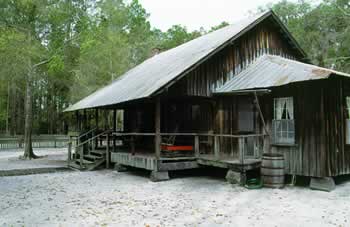
The Natural Georgia Series: The Okefenokee Swamp

 |
The Natural Georgia Series: The Okefenokee Swamp |
 |
Bernice Chesser Roddenberry, born in the Okefenokee on Billys Island in 1920,
still lives near the swamp and shares her experiences and memories of swamp
life as a volunteer at the Chesser Island Homestead. Today, she enjoys fishing
in the Okefenokee, and canoeing through it with her children and grandchildren.
"We fish along on the trips and usually catch enough to fry on Floyds Island
when we get there for supper," Roddenberry says.
It was her great grandfather, William T. Chesser, who settled in the swamp
on Chesser Island around 1858. Her grandfather, Robert Allen Chesser, was born
on Chesser Island, and later built his home across the road from the standing
Chesser Island Homestead. "In my dad's family, there were 13 born to them
and they raised 12. There's two living today. One is in Folkston and the other
is in St. George," Roddenberry says.
"My parents were Harry and Neetie Chesser. There were 11 of us. I had
10 brothers and sisters. I had four brothers and seven sisters. I was the second
one. I'm the oldest one since my sister passed away."
It was Roddenberry's uncle, Tom Chesser, who built the homestead open for
touring today. She remembers visiting the current home and the log home before
it although she never lived on Chesser Island.
Roddenberry was between five and six years old when her family left Billys
Island. Her father worked to help saw the timber hauled from the island to Hebardville,
and the family left when the work was done. Although she never went to school
on Billys Island, she says there were as many as 96 children in school there
at one time. One of her few memories of life on the island involves playing
with those children and almost losing her life.
"I fell in the dipping vat once, where they dip cows for ticks,"
Roddenberry says. "Ticks used to be real bad, and they still are, but not
as bad as they were a long time ago I don't think. I remember Mama putting me
under a pump and rinsing me off good. There were a bunch of us playing the day
after they dipped cows. They had it [the dipping vat] fenced in, and we were
playing around the fence. So I fell in. They put a rake or a hoe or something
down to me, and I grabbed hold of that thing. It was pretty deep. You know how
big a cow is! Dr. Revis was the doctor and he came in on the trolly (or the
train). He told Mama that if I hadn't vomited, I would have been a goner because
I had swallowed some of that dip.
"I didn't go out of the swamp until we moved out from the island on the
train," Roddenberry says.
After living briefly in Carbor, Florida, Roddenberry's family moved back to
the Okefenokee, to Charlton County, when she was nine years old. Her father
worked for Dan Hebard, guiding tours through the swamp and helping with hunting
expeditions to Floyds Island.
"Mr. Hebard would come in the winter time and live at Colerain [on the
Camden/Charlton County line], and my father would help put out corn for the
ducks on the blinds out there. Mr. Hebard would bring friends and they would
shoot ducks out there in the winter…Baiting the blinds is what they called
it."
Roddenberry says, "To get to the island, you would leave the landing
here [where the boardwalk and tower are on the east side of the swamp today],
go down the canal, and there was a cornbox where you turned off to go the prairies.
There was another cornbox at Floyds Island at the end of a boardwalk. They would
store stuff in that cornbox - what they didn't take with them in a wheelbarrow
to the island."
Roddenberry's husband, James, started working for Hebard in the swamp when
he was 17 years old. "He was baiting the blinds, and if they killed ducks,
he had to clean them," she says. "I was about 14 when we first met
because he'd come by to get daddy to go out in the swamp with them."
The two were married in 1937 and had 11 children - four boys and seven girls.
One daughter, Judy, works at the swamp, and another, Sheila, is a volunteer
there. James, a retired surveyor for Union Camp, died in 1980.
Today, Roddenberry lives near the swamp in the Sardis District on the old
Roddenberry place. She lives near Sardis Church, the oldest church in Charlton
County, where her grandparents attended church each Sunday.
Judging by the number of places and objects named after the Chessers, the family must have played a prominent role in the cultural history of the Okefenokee. There is Chesser Island, Chesser Praire, and open for touring on the eastern side of the swamp is the Chesser Island Homestead. During their tenure living in the swamp, the Chessers welcomed one of the Okefenokee's most famous researchers, Francis Harper, who lived in a tent behind the Chesser home temporarily. And they worked for Dan Hebard, joining him in his timber operations and hunting expeditions.
Read and add comments about this page
Go back to previous page. Go to Okefenokee Swamp contents page. Go to Sherpa Guides home.
[ Previous Topic | Next Topic ]